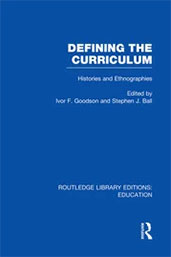Defining the Curriculum: histories and ethnographies
Subjects for Study: towards a social history of curriculum
But beyond the problem of the specificity of curriculum histories lies the problem of the nature of curriculum histories. Clearly (following hypothesis 1), history is no monolithic subject or method. In history there are schisms which resemble those in other subjects - notably the disagreement between the 'general law' school of historians and what we might call the 'uniqueness' school (for example, 'the special interest of the historian is not in classes of events but in the uniqueness of each event').
At one level the argument for curriculum histories merely reiterates the need to study how the curriculum has evolved, to understand historical background and origins so as to provide a context for contemporary inquiry. By this view historical studies can extend the range of our accounts. I would want to go further than this and argue that histories are important because of their potential to transform our accounts: to pose fundamental questions and to point towards new agendas for study, for instance, reformulating notions of 'domination', changing the priority given to prior socialization in accounts of subject change or stressing the importance of professional subject groups in the evolution of the curriculum.
The specificity and nature of history leave us with a dual challenge 'in conducting future curriculum histories. First, where possible, they must pursue the gradual and continuous nature of curriculum change (certainly in systems as decentralized as ours) so as to illuminate contemporary situations; this argues against too rigidly 'periodized' histories. Secondly, they must aspire not only to extend our range of data but to contribute to the examination and reformulation of hypotheses and theories, thereby offering the potential for transforming our accounts.
These aspirations have to be set against the limitations of the studies reported here. I hope, however, that some progress has been indicated as well. Curriculum histories point to the evolutionary nature of subjects as coalitions 'more or less delicately held together under a common name at particular periods'. The nature of these coalitions responds to both the structuring of material interests and the 'changing climates' for action. Because of the manner in which resources (and associated career prospects) are distributed, and status attributed, 'academic' subject groups normally develop as 'dominant coalitions'. The conflict over the status of examinable knowledge therefore becomes the crucial conflict arena where the subject coalitions (and their representative associations) contest the right to material resources and career prospects.
